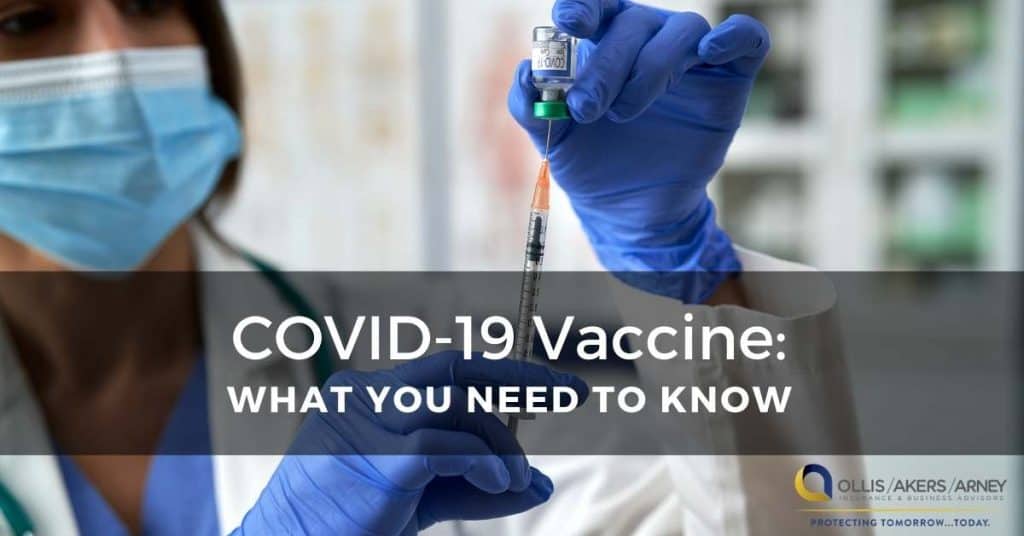There is a lot of information going around about the COVID-19 vaccine. This article contains everything you need to know right now.
Why Am I Hearing About Two Vaccines?
There are two vaccines that have been given emergency use authorization by the Food and Drug Administration at the time of this writing: the Pfizer-BioNTech vaccine and the Moderna vaccine. The vaccines differ in some ways (namely, how they must be shipped), but they are fundamentally the same.
While short of full approval, the emergency use authorization allows both COVID-19 vaccines to be distributed in the United States for individuals 18 years of age and older for the Moderna vaccine, and individuals 16 years of age and older for the Pfizer-BioNTech vaccine.
What’s In the Vaccine?
Both versions of the vaccine work by “tricking” your body’s immune system into creating antibodies that fight against COVID-19. This is the same underlying method used in most modern vaccines, including the flu vaccine given to millions each year.
What Are the Side Effects?
There is a chance you may experience mild side effects after taking the COVID-19 vaccine. This is a normalpart of the process and simply means the vaccine is working. Some of the symptoms include:
- Pain, redness or swelling near where the shot was administered
- Fatigue
- Joint pain
- Chills
- Headache
- Fever
Be mindful of these symptoms and be prepared to deal with them after getting the shot. For instance, you may wish to stock up on sports drinks and headache medication before your vaccination appointment.
Contact your doctor if you have symptoms that worsen or persist after a couple days.
How Will It Be Administered?
The vaccine must be administered in two doses—one initial shot and another three to four weeks later. Getting both shots will ensure you receive the most protection.
How Much Will It Cost to Receive It?
According to the Centers for Disease Control and Prevention (CDC), “Vaccine doses purchased with U.S. taxpayer dollars will be given to the American people at no cost. However, vaccination providers may be able to charge administration fees for giving the shot.”
To determine whether a fee is required for your vaccine, contact your insurance provider or whomever will be administering your shot prior to your appointment.
When Can I Get the Shot?
There is currently a limited supply of the vaccine. As such, high-risk individuals will be prioritized. The first wave of vaccines will go to frontline health workers and members of senior living facilities. As production continues, the vaccine will be distributed to hospitals, pharmacies, doctor’s offices and health centers as soon as large enough quantities are available.
This means you may likely wait weeks or months before you can receive the vaccine.
Can I Stop Wearing a Mask After Getting the Shot?
Even after receiving both doses of the vaccine, you must continue following COVID-19 preventive safeguards. This includes covering your mouth and nose with a mask when around others, staying at least 6 feet away from others, avoiding crowds and washing your hands often.
It’s important for everyone to continue using all the tools available to help stop this pandemic as we learn more about how COVID-19 vaccines work in real-world conditions.
Fast Facts About the COVID-19 Vaccines1
You’ve probably heard that a vaccine will help bring an end to the pandemic. Now that there are two vaccines authorized for use, you may have questions about those vaccines, especially in the age of misinformation. Here’s what you need to know about the COVID-19 vaccines.
What type of vaccines are the COVID-19 vaccines?
Messenger RNA vaccines—also called mRNA vaccines—are some of the first COVID-19 vaccines authorized for use in the United States.
What are mRNA vaccines?
mRNA vaccines are a new type of vaccine to protect against infectious diseases. Unlike other vaccines, mRNA vaccines don’t involve putting a weakened or inactivated germ into your body to trigger an immune response. Instead, mRNA vaccines teach your cells how to make a protein—or even just a piece of a protein—that triggers an immune response, and then antibodies, inside your body to protect you from getting infected if you’re exposed to the real virus.
Are they safe?
mRNA vaccines have been held to the same rigorous safety and effectiveness standards as all other types of vaccines in the United States. The only COVID-19 vaccines the Food and Drug Administration will make available for use in the United States (by approval or emergency use authorization) are those that meet these standards.
Where Can I Learn More?
The CDC updates its website regularly with new COVID-19 vaccine information: www.cdc.gov/coronavirus. For more specific health guidance, speak with your doctor.
Can you get COVID-19 from the mRNA vaccines?
No, mRNA vaccines do not use the live virus that causes COVID-19.
Do the COVID-19 mRNA vaccines affect or interact with your DNA?
No, mRNA never enters the nucleus of the cell, which is where our DNA (genetic material) is kept. The cell breaks down and gets rid of the mRNA soon after it is finished using the instructions.
Can anyone get the COVID-19 vaccine?
Ultimately, the goal is that everyone who is able and wants to be vaccinated against COVID-19 receives two doses of one of the two authorized vaccines. However, because there are limited doses available, the Centers for Disease Control and Prevention (CDC) have issued guidelines for who should receive vaccination priority. If you believe you fall in one of these categories, contact your doctor or employer for more information.
For help with other questions or business services contact Ollis/Akers/Arney Insurance & Business Advisors.
1Fast Facts Source: CDC


